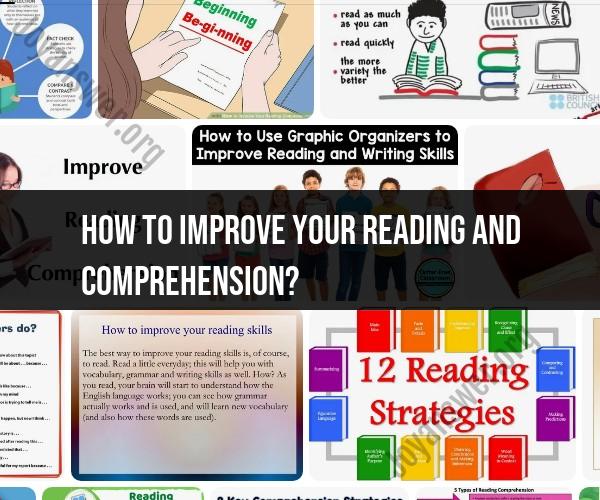How to improve your reading and comprehension?
Improving your reading and comprehension skills is a valuable endeavor that can benefit your education, career, and personal growth. Here are some effective strategies to enhance your reading and comprehension skills:
1. Active Reading:
- Engage with the text actively. Ask questions, make predictions, and mentally summarize as you read. This keeps your mind focused and attentive.
2. Pre-Reading Preparation:
- Before diving into the text, skim it to get an idea of its structure and content. Pay attention to headings, subheadings, and any visual aids like images or diagrams.
3. Vocabulary Building:
- Enhance your vocabulary by regularly learning new words and their meanings. This will help you grasp the author's intended message more easily.
4. Annotate and Highlight:
- Take notes in the margins or highlight key points, phrases, or unfamiliar words. This can help you remember and review important information.
5. Summarize:
- After reading a section or chapter, write a brief summary in your own words. This reinforces your understanding of the material.
6. Break It Down:
- For complex or lengthy texts, break them down into smaller sections or chapters. Focus on understanding one part at a time before moving on.
7. Use Visualization:
- Create mental images of what you're reading. Visualizing the content can help you remember and comprehend it better.
8. Read Aloud:
- Reading aloud forces you to slow down and pronounce words. It also engages your auditory senses, which can aid comprehension.
9. Join a Book Club or Discussion Group:
- Participating in discussions about what you've read can deepen your understanding and expose you to different perspectives.
10. Practice Mindfulness:- Clear your mind of distractions before reading. Mindfulness techniques can help you stay focused and attentive.
11. Ask Questions:- Formulate questions about the material as you read. This encourages critical thinking and keeps you engaged.
12. Challenge Yourself:- Occasionally read material that is slightly above your current reading level. Challenging yourself can lead to growth in comprehension.
13. Take Breaks:- Don't force yourself to read for long periods without breaks. Short, frequent reading sessions can be more effective.
14. Seek Clarification:- If you don't understand something, don't hesitate to look it up or ask someone for clarification.
15. Read Regularly:- The more you read, the better you become at it. Set aside time for reading each day, even if it's just a few pages.
16. Use Digital Tools:- Some digital tools, such as e-readers and apps, offer features like instant definitions and note-taking, which can aid comprehension.
17. Read a Variety of Materials:- Explore different types of content, including fiction, non-fiction, newspapers, magazines, and academic texts. Diverse reading can broaden your comprehension skills.
18. Review and Reflect:- After finishing a book or article, take some time to reflect on what you've learned and how it relates to your existing knowledge.
19. Seek Feedback:- If you're studying or reading for academic purposes, ask for feedback from teachers or peers on your comprehension and analysis of texts.
Remember that improving reading and comprehension skills takes time and practice. Be patient with yourself and persistently apply these strategies to see gradual improvement. Reading is not just about decoding words; it's about understanding and connecting with the content on a deeper level.
Enhancing Reading Comprehension: Strategies for Improvement
Reading comprehension is the ability to understand what you read. It is a complex skill that involves a variety of cognitive processes, such as decoding, vocabulary, grammar, inference, and critical thinking.
There are a number of strategies that you can use to improve your reading comprehension. Here are a few tips:
- Preview the text. Before you start reading, take a few minutes to preview the text. This will give you a general understanding of the topic and the author's purpose.
- Set a purpose for reading. What do you want to learn from the text? Keeping your purpose in mind as you read will help you to focus and stay engaged.
- Read actively. Don't just passively read the text. As you read, ask yourself questions, make predictions, and summarize the main points.
- Annotate the text. Highlighting important passages, taking notes, and writing questions in the margins can help you to better understand and remember the text.
- Reread difficult passages. If you don't understand something, don't be afraid to reread it. You may also want to try reading it aloud or summarizing it to yourself.
- Discuss the text with others. Talking about what you have read with a friend, family member, or teacher can help you to clarify your understanding and gain new perspectives.
Reading and Comprehending: Tips for Skill Enhancement
Here are some additional tips for enhancing your reading comprehension skills:
- Expand your vocabulary. The more words you know, the better you will be able to understand what you read. Make an effort to learn new words every day.
- Improve your fluency. Fluency is the ability to read quickly and smoothly. Good fluency can help you to better understand and remember what you read. You can improve your fluency by practicing reading aloud.
- Develop your background knowledge. The more you know about a topic, the easier it will be to understand what you read about it. Make an effort to learn about the world around you by reading news articles, watching documentaries, and talking to people with different backgrounds.
- Use graphic organizers. Graphic organizers, such as mind maps and concept maps, can help you to visualize the relationships between different ideas in a text. This can make it easier to understand and remember the text.
Mastering Reading Comprehension: Techniques for Progress
If you are serious about mastering reading comprehension, here are a few more advanced techniques that you can use:
- Identify the author's purpose. What is the author trying to achieve by writing the text? Are they trying to inform, persuade, or entertain you? Understanding the author's purpose can help you to better understand the text.
- Analyze the author's argument. If the author is trying to persuade you, identify their main arguments and supporting evidence. Evaluate the strength of their arguments and consider whether or not you agree with them.
- Make inferences. Inferences are conclusions that you draw based on the information that is provided in the text. Making inferences can help you to fill in gaps in the text and to understand the author's meaning more deeply.
- Critically evaluate the text. Consider the author's credibility, the accuracy of the information, and the validity of the arguments. Do you have any questions or concerns about the text?
By using these strategies and techniques, you can improve your reading comprehension skills and become a more effective reader.












